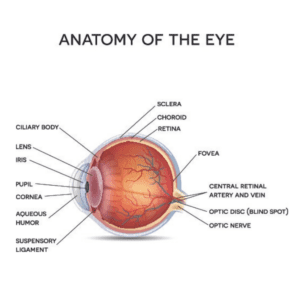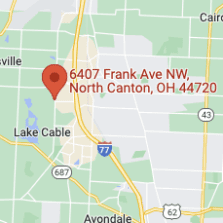Flashes of light and floaters in your eyes can have many causes, both eye-related and non-eye-related. They’re commonly caused by natural changes in the eyes as you age, but they can also signal serious, vision-threatening conditions like retinal detachment.
Read on to learn about the possible causes of seeing flashing lights in the corner of your eye and when you should see a doctor.
Anatomy of the Eye & Flashing Lights
Seeing flashes of light in your eye is a result of changes in the retina, which is one of the most important parts of the eye. The retina is a thin light-sensitive tissue that transmits electrical signals to your brain via the optic nerve. It processes the focused light that comes in through your pupil and allows your brain to convert the information into a picture. 
Both floaters and a flash of light in the eye are caused by shrinking vitreous. The vitreous is fluid in the back of the eye that protects the retina and helps the eye maintain its shape. It’s attached to the retina by small fibers, and the friction that occurs on these fibers can lead to flashing lights in the eye.
Your vitreous supply naturally diminishes as you age, and as the gel changes consistency, it separates from the retina in a normal process called posterior vitreous detachment. These pieces of vitreous gel drift in front of the retina, which is why you see floaters in your field of vision.
Floaters can look like dust, cobwebs, or specks, and they appear differently for everyone. Anyone can experience floaters, but they are most common in people in their 50s, 60s, and 70s. Conditions like diabetes, nearsightedness, and past eye swelling can increase your risk of experiencing flashing lights and floaters.
What Causes Flashes of Light In The Eyes?
 There are a few main causes of flashing lights in the eye. Posterior vitreous detachment is the most common and usually not a cause for concern unless you have symptoms of retinal detachment, which can include a sudden increase in seeing flashing light in eye.
There are a few main causes of flashing lights in the eye. Posterior vitreous detachment is the most common and usually not a cause for concern unless you have symptoms of retinal detachment, which can include a sudden increase in seeing flashing light in eye.
There are also non-eye-related causes of flashing lights in eye, such as migraine disorders.
Posterior Vitreous Detachment (PVD)
This condition typically happens as you get older. The vitreous detaches from the retina, and if it happens too quickly, it can cause small flashes of light, usually in the corner of your eye. It can also cause floaters. PVD usually doesn’t require treatment.
Optic Neuritis
Optic neuritis occurs when the optic nerve becomes inflamed. This can be caused by an infection or a nerve-related disorder like multiple sclerosis. Light flashes in eye can be a symptom of optic neuritis.
Retinal Tears & Detachment
This is a serious condition in which the retina detaches, shifts, or moves away from the back of the eye. If left untreated, retinal detachment can cause partial or complete loss of vision. If you have sudden repeated flashes in the form of bright spots, streaks of lightning, or shooting stars in the corner of your eye, you may have a retinal tear or detachment, and you should see an eye doctor right away.
Retina Pressure
Rubbing your eyes, coughing, or getting hit on the head can cause flashes of light in your eyes because of added pressure on the retina.
Can High Blood Pressure Cause Flashing Lights in Eyes?
Some signs of high blood pressure can be detected during an eye exam. One symptom is hypertensive retinopathy, which is when high blood pressure causes changes to the blood vessels in the retina. If you see flashing lights or floaters in your eyes, this can mean that high blood pressure is affecting the blood vessels in your eyes.
If you have sudden blurred vision, double vision, or an increase in flashes and floaters, you should see an eye doctor.
NEOES Eye Doctors
At Northeast Ohio Eye Surgeons, we have numerous optometrists and ophthalmologists who specialize in treating disorders of the retina.
If you have concerns about flashing lights or floaters in the eye, we encourage you to schedule an appointment with one of the following specialists:
- Michael L. Smit, D.O.
- Jerry I. Macher, M.D.
- Timothy W. Earley, O.D.
- Emma Reynolds, O.D.
- Myron E. Bodnar, M.D.
- Amy Fernandez, O.D.
- David B. Beckett, O.D.
When Should I See a Doctor?
Retinal detachment is a medical emergency. If you experience the following symptoms, you should seek medical attention right away:
- Sudden, repeated eye flashes
- A sudden increase in eye floaters
- Loss of peripheral vision
- Narrowing of the visual field
- A curtain in front of the eye
You should also visit an eye doctor if you experience the following symptoms:
- Blurred vision
- Darkening vision
- Vision loss
- Dizziness
- An eye injury
- Frequent ocular migraines (episodes of vision loss in one eye, usually lasting less than one hour and associated with a headache)
- Vision changes
Retinal Detachment Surgery & Treatments
If you have symptoms of a retinal tear or detachment, you should receive a dilated eye exam as soon as possible. Treatment can prevent a tear from progressing into a detachment.
Retinal tears are treated with laser surgery, which creates small burns around the tear. These burns heal into small scars that stop the tear from enlarging. Retinal detachments are treated similarly, but the retina must be pushed back into place before the tears can be repaired.
The expert eye doctors at NEOES are highly experienced in performing advanced procedures to treat a wide variety of eye conditions, including retinal detachment. If you’re having any unusual visual symptoms, schedule an appointment at one of our eye clinics today.















Recent Comments